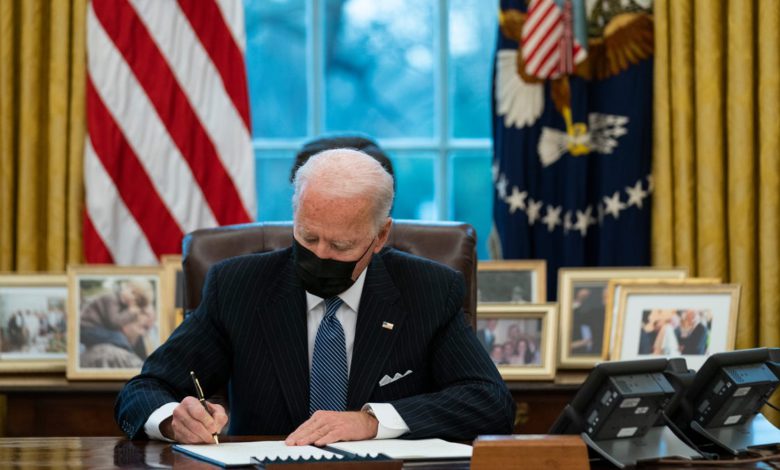
Michael Canty worries President Biden’s administration is poised to crank out a thicket of new regulations – in areas such as oil and gas drilling, workplace safety and labor -- that will slow the growth of his manufacturing company in Mentor, Ohio.
So Canty says he has shelved plans to spend up to $2 million on new equipment and add about 15 employees to his staff of 85. For now, he's waiting to see how Biden’s regulatory agenda plays out.
Missouri farmer Kalena Bruce is holding off on expanding her cow herd because of concerns that administration officials will broaden the types of water bodies that must be protected from the effects of farming to include ditches that fill with water during heavy rains.
Biden: 'Prepared to compromise' on infrastructure
President Joe Biden met at the White House Monday with a bipartisan group of lawmakers to push his $2 trillion dollar jobs and infrastructure plan. Biden said he's "prepared to compromise" on what's in the package as well as how to pay for it. (April 19)
AP
And Cincinnati-based marketing agency owner Mark Homer frets Biden’s revamping of a Trump-era rule that makes it easier to bring on independent contractors could force him to lay off most of his freelancers, hampering his ability to take on new clients.
In his first few weeks in office, Biden signed a whirlwind of executive actions — many halting or reviewing steps President Trump’s administration took to roll back climate change regulation and loosen workplace safety and labor protections. A push to eventually reinstate broadband regulation also may be in the offing.
Biden economy is 7 charts: How economy has performed during his first 100 days
Vaccines are shot in arm for growth: The economy grew 6.4% in Q1

The efforts are putting a fresh spotlight on a decades-old question: Does regulation hurt economic and job growth?
Trump boasted that his sweeping deregulation —– which largely reversed Obama-era rules — was a big driver of the economy’s pre-pandemic growth. Traditionally, Republicans have argued that cumbersome federal rules force firms to hire attorneys, spend many hours filling out paperwork or purchase costly equipment, such as pollutant filters, leaving less time and money to run and grow their businesses.
Biden appears set on undoing much of that legacy, with the goal, he says, of promoting “public health and safety, economic growth, social welfare, racial justice, environmental stewardship, human dignity, equity, and the interests of future generations.” Indeed, the debate about whether regulation restrains the economy doesn't consider the social benefits of new rules, which theoretically should outweigh the financial costs.
Many Republicans aren’t swayed.
“Unfortunately, recent actions undertaken by your office threaten the security of a pared-back, streamlined regulatory landscape that directly contributed to the explosive pre-COVID growth experienced by small businesses,” Representative Blaine Luetkemeyer, Republican of Missouri and ranking member of the House Small Business Committee, wrote in a letter on April 12 to Biden and other administration officials.
The share of small businesses calling regulations their single most important problem fell from about 20% late in Obama’s term to 11% in August while Trump was in office. That share then ticked up from 14% late last year to 15% in the early months of Biden’s presidency, surveys by the National Federation of Independent Business (NFIB) show.
If Trump’s deregulatory moves were not a major factor in expanding the economy, then reinstating those regulations (under Biden) will not impede economic growth.
Democrats and many economists say companies make decisions about whether to expand and hire based on customer demand, not regulations. Several recent studies conclude that Trump’s deregulation helped some industries and hurt others but had little or no effect on the overall economy.
“If Trump’s deregulatory moves were not a major factor in expanding the economy, then reinstating those regulations (under Biden) will not impede economic growth,” says Cary Coglianese, director of the Penn Program on Regulation at the University of Pennsylvania Law School and co-author of one of the studies.
Trump supporters counter that it’s difficult to measure the economic effects of easing or toughening regulation and that Trump’s tax cuts and deregulation unleashed the animal spirits of U.S. businesses, providing them the confidence to invest and hire. Biden’s proposed tax increases and regulatory agenda could have a chilling effect, they say.
With higher regulatory costs, “You’re more likely to hold onto the money you have,” says Dan Bosch, director of regulatory policy for the center-right American Action Forum.

In his initial days in office, Biden canceled the permit to build the Keystone XL oil pipeline from Canada to Texas, committed the U.S. to rejoin the Paris climate accord, and halted new oil and natural gas leases on federal land and waters – all of which reversed Trump actions to unshackle fossil fuel companies. And he ordered reviews of Trump moves to lower vehicle fuel efficiency standards, lift requirements to fix methane leaks from oil and gas wells, and streamline environmental reviews of infrastructure projects.

The Biden administration is also more aggressively enforcing workplace safety standards and reviewing a Trump rule that broadened the types of workers that employers can classify as independent contractors.
It’s too early to judge the outcomes of Biden’s reviews, says Neil Bradley, executive vice president of the U.S. Chamber of Commerce, adding, “The business community wants to work with the administration.” But, he says, “If we don’t get this right, it could well dampen investment and hiring.”
In the meantime, even the threat of new rules could lead companies to sit on their hands, he says.
“There is ... an economic cost to regulatory uncertainty,” Bradley says.
The business community wants to work with the administration. If we don’t get this right, it could well dampen investment and hiring.
Trump and Biden couldn’t be more polar opposite in their approaches to regulation. Trump was the first president to methodically attack federal agency rules, establishing a requirement to eliminate two for every one added. Biden quickly scrapped the mandate and proposed that cost-benefit studies of new regulations consider benefits “that are difficult or impossible to quantify.”
Any harmful effects from even the risk of new regulations will be difficult to tease out in this year’s booming recovery from the COVID-19-induced downturn, says economist Andrew Hunter of Capital Economics. Biden has helped turbocharge that growth, spearheading the $1.9 trillion COVID relief package passed by Congress in March.
The economy is expected to slow next year as the effects of the relief package fade, possibly elevating the significance of any new rules that may curtail growth. Even Biden’s $2.3 trillion "Build back better" infrastructure proposal could be significantly delayed if officials reinstate Obama-era environmental reviews that, according to the nonprofit Common Good, pushed back major highway projects an average of six years and inflated their costs. The Trump administration limited such reviews to two years and eased requirements to consider a project's greenhouse gas emissions.
“We want to build back better sooner and not later,” says Nick Goldstein, who heads regulatory affairs for the American Road and Transportation Builders.
The left-leaning Center for American Progress says Trump officials “gutted” the regulations and undermined efforts to fight climate change.

Some businesses say they’re already pulling back amid the prospect of tougher oversight.
Canty, the CEO of Alloy Precision Technologies, says he spent $8 million on factory expansions and new equipment in the Trump era but fears the pause in oil and gas leases on federal land, along with other constraints, will hammer his company’s revenue. Alloy Precision makes metal parts for natural gas-fueled power plants and for pressure control in oil and natural gas wells.
“If my customers can’t drill for oil and gas, I can’t sell to them,” he says.
Canty also worries about tougher workplace safety inspections, noting he was fined $15,000 during the Obama administration because a plastic guard on a metal-cutting machine was 1/8th inch off its previous position. And he fears that Biden will make it easier for workers to unionize.
Harold Hamm, executive chairman of Continental Resources, an Oklahoma-based oil and gas producer, fears Biden “is going to pile more regulations on and stop the positive things in the industry…'Drill baby, drill' is over.”
But producers like Continental are nimble. If drilling activity is restricted on federal land, where Continental has about 10% of its wells, the company will simply shift those leases to private property, Hamm says.
Yet while fossil-fuel companies likely will be hobbled by more restrictions, the industry’s production and jobs will be replaced by clean energy, resulting in a wash for the economy over time, Coglianese says. A report by the nonprofit Environmental Entrepreneurs says clean energy already employs nearly three times as many workers as does fossil fuel extraction and generation.
“You’re going to end up with winners and losers,” the economist Hunter says of any new regulations.
And in the long run, renewable energy helps avoid the untold economic costs wrought by global warming through hurricanes, floods and wildfires, says Mark Zandi, chief economist of Moody’s Analytics.
Other industries are also nervous about a potential rise in regulatory costs.


Top: Kalena Bruce with husband, Billy and daughter, Willa. Bottom: Kalena and Willa Bruce on the family's farm.
Left: Kalena Bruce with husband, Billy and daughter, Willa. Right: Kalena and Willa Bruce on the family's farm.
Handout
Bruce, who raises 50 cows in Stockton, Missouri, notes the U.S. water rules, which prohibits discharges of pollutants into “navigable waters,” were streamlined under Trump to exclude temporary water bodies such as ditches that fill with rainwater. She’s concerned the Biden administration’s reassessment could revive the old rule, requiring her to obtain permits she can’t afford if she expands her herd. So she’s putting off the $31,000 purchase of 20 cows.
“We’re in a holding pattern,” she says.
Amanda Levin, a policy analyst at the Natural Resources Defense Council, says the water rules typically exclude most pollution discharges from routine farming, like runoff from fields.
Biden is also expected to crack down on companies that misclassify workers as contractors, denying them minimum wage, overtime and other benefits. Homer, CEO of GNGF, an 11-employee marketing agency for law firms,
worries that a restrictive new rule could force him to convert a couple of his five to 10 contractors to employees and lay off the rest. They typically handle surges in work, such as when he signs up new clients.
“It would limit my growth,” he says.

Catherine Ruckelshaus, general counsel of the National Employment Law Project, says misclassifying workers as contractors also hurts the economy by denying workers higher wages and benefits.
“We don’t just want more crappy jobs,” she says.
Some entrepreneurs, meanwhile, aren't concerned about the prospect of more oversight. Frank Knapp, who owns a pet boarding and grooming facility in Irmo, South Carolina, says he wouldn’t mind complying with new rules, such as a $15 federal minimum wage, as long as his competitors are subject to them.
“We’re all doing the same thing,” says Knapp, who heads the South Carolina Small Business Chamber of Commerce. If his costs rise, he says he’ll simply raise prices to maintain profits rather than lay off workers.

While companies and industries are often affected by looser or stricter rules, studies say Trump’s deregulation didn't move the needle on the broader economy.
Several found that Trump overstated how much red tape he actually cut. Capital Economics and Goldman Sachs concluded he actually didn’t substantially reduce regulations but the flow of new rules slowed or largely stopped after creeping up for decades.
“It was the absence of new regulations that was a sigh of relief for small businesses,” says Holly Wade, executive director of the NFIB Research Center. Since small business owners handle regulatory compliance themselves, they had more time to run their firms, she says.
It was the absence of new regulations that was a sigh of relief for small businesses.
After accounting for regulations both added and cut during Trump’s term, there was a net savings of about $160 billion in regulatory costs in future years, according to an American Action Forum analysis of Trump administration figures. Another report by Trump’s Council of Economic Advisers says 20 major deregulatory actions will save consumers and businesses about $220 billion a year after they take full effect.
Yet that's only 1% of the $21 trillion U.S. economy. The Penn study also underscores the challenges of isolating the benefits of deregulation. Although lower fuel efficiency standards will bring down car prices, for example, motorists will end up spending more overall because of higher fuel costs.
All told, Capital Economics found little change in a range of economic gauges during Trump’s term. After getting a tax cut-related boost in early 2018, business investment was sluggish the rest of that year and throughout 2019 before the pandemic. Growth in productivity -- or output per worker – ticked higher in 2018 and 2019 but Hunter credits low unemployment that forced companies to squeeze more out of existing employees or buy labor-saving technology.
An exception is Trump’s deregulation of the oil industry, which appeared to lift crude production during his term, the study says. Still, drilling activity continued to track the ups and downs of oil prices.
“If deregulation truly was revitalizing the oil sector, we would expect to see drilling activity rising at a materially stronger pace,” the study says.
Overall, the economy grew an average of 2.5% a year during the first three years of the Trump administration, compared to a nearly identical 2.43% during Obama’s last three years while 1.5 million more jobs were added under Obama.

Bosch, of the American Action Forum, says that without Trump’s tax and regulation cutting, economic and job growth would have been weaker as the record-long recovery that began in 2009 began petering out.
And a report by the Mercatus Center at George Mason University argues the effects of regulations are nuanced and their buildup over time “leads to duplicative, obsolete, conflicting, and even contradictory rules,” and distorts company decision-making. Also, a drop in investment because of regulatory costs leaves a smaller economy that has ripple effects for decades, says James Broughel, a senior research fellow at Mercatus.
From 1977 to 2012, the study found, regulation decreased economic growth by nearly a percentage point a year.
“It’s the cumulative effect,” Broughel says.
Source link








